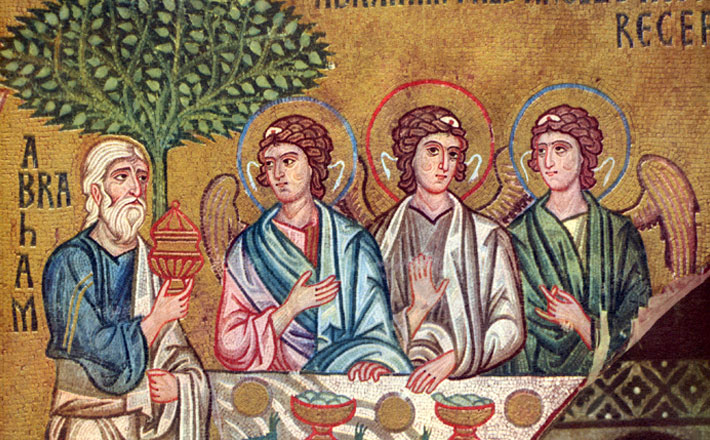Commentary on Luke 10:38-42
The design and structure of Luke’s story about Jesus’ visit in the home of Mary and Martha (Luke 10:38-42) is straightforward, and it is told in a linear fashion.
Martha extends hospitality to Jesus (38).
Mary listens to Jesus’ teachings (39).
Martha attends to the duties of hospitality (40a).
Martha complains that Mary has neglected the duties of hospitality (40b).
Martha asks Jesus to instruct Mary to help her (40c).
Jesus responds that Mary has chosen the better activity (41-42).
Within the larger travel narrative (Luke 9-19), such stories as this revolve around the act of traveling and feature elements that are representative of the ancient Mediterranean custom of either hospitality or inhospitality.
The passage begins on this note: “Now, as they went along, he entered a particular village, and a woman named Martha welcomed him” (Luke 10:38). While Martha has fulfilled the typical expectations associated with a host, it is her sister, Mary, for whom Jesus reserves his highest praise. The contrast between the sisters’ actions is striking: “She had a sister named Mary, who had taken a seat at the feet of the Lord and was listening to him speak. Martha, though, was distracted by all that needed to be done” (10:39). Martha busies herself with “the details of serving” while Mary chooses to sit at the Lord’s feet and listen to what he was saying. Apparently exasperated, Martha confronts Jesus about her sister’s actions, “Lord, doesn’t it concern you that my sister left me to serve alone? So, speak to her in order that she might help me” (Luke 10:40). Rather surprisingly, Jesus replies, “Martha, Martha, you are worried and troubled about many things, but only one thing is necessary. Mary, in fact, has made the right choice, and it will not be taken from her” (10:41-42). In this light, it would be difficult to imagine that the authorial audience understood Jesus’ praise of Mary to be an implicit criticism of Martha’s hospitality (a point underscored by the repetition of Martha’s name, an example of conduplicatio, a rhetorical device used to indicate compassion or pity).1 Of course, Jesus had the capacity to level such criticism, as we see in the story of one Simon the Pharisee, who fails to follow proper hospitality protocols (Luke 7:36-50).
The passage turns on the meaning of the “one thing.” The “one thing” in Jesus’ logic is the “best part” which Mary has chosen. And what is that? According to Jesus, hearing the word of God’s messenger is the one thing needed, not providing for his physical needs (also Luke 8:15, 21). Thus, however important hospitality is in Luke as a social context for the spread of the Christian message, it is even more important to have followers who attend to Jesus’ messengers. The saying is less a condemnation of Martha’s frenzied activity and more a commendation of Mary’s posture as a disciple.
The language and setting of the story of Mary and Martha are reminiscent of the social custom of ancient hospitality, generally understood, in the ancient world, to refer to kindness shown to strangers.
The constant social context in ancient hospitality scenes appears to be travel. Hospitality was a highly valued and presumably widely practiced custom among pagans, Jews, and Christians. Hosts were expected to provide food, shelter, amenities, and protection to these traveling strangers, who sometimes turned out to be gods incognito.2 In Greek culture, Zeus was celebrated as the god of hospitality3, and the practice of hospitality (among other things) separated high Greek civilization from the “barbarians.” Often these hospitality scenes ended with the host bestowing gifts upon the guest.4 Jewish examples of hospitality also abound (e.g., Genesis 18:1-16; compare with also Genesis 19:1-23; 24:10-61; 43:16-34; Exodus 2:15-22; Joshua 2:1-22; Judges 4:17-22). Luke has a particular interest in issues of hospitality (Luke 7:36-46, 10:38-40; 19:1-9, compare with also Acts 9:43-11:3, 21:3-6, 21:7, 21:8-16; 28:6-10; 28:13-14). Often, as in our text here, the host initiates hospitality (Luke 7:36; 10:38; Acts 10:23; 10:22; 28:7).
This Lukan social ethic provides a solid foundation for Christian habits and practices both within the community (we have unlimited responsibilities to fellow believers) and with the world (we are called to provide Christian hospitality to those unlike us in nationality, faith, or ethnicity and assistance to those in immediate crisis). Christians are called to extend hospitality both as hosts and guests, and to fellow believers and non-believers alike. Such hospitality calls for personal and intimate engagement in a way that an insipid value such as “tolerance” does not. We are not called simply to “tolerate” or “endure” those not like us; rather the ancient “Christian virtue” of hospitality demands that we engage and interact with the Other, whether we are guest or host.
But there is another motif running alongside the theme of hospitality. Yes, Martha, the host, has busied herself with caring for her guest, and she exemplifies ideal hospitality. In the subsequent history of interpretation, Martha also represents the vita active, the active life. Mary, on the other hand, represents the vita contemplativa, the contemplative life. She sits at the feet of Jesus as a student and listens to him teach. Both the active life and the contemplative life are needed; to choose one over the other can create a false dichotomy. Ambrose observed: “Virtue does not have a single form. In the example of Martha and Mary, there is added the busy devotion of the one and the pious attention of the other to the Word of God.”5 Still, Christ gently reminds Martha (and Luke’s audience), that Mary’s is “the better part,” because actions — even acts of Christian charity and hospitality — if they are to be sustained, always follow being; that is, what we do flows naturally from who we are.
Material adapted from Luke. Paideia Commentary Series. Eds. Mikeal C. Parsons, Charles H. Talbert, and Bruce. Longenecker. Grand Rapids: Baker Academic (a division of Baker Publishing Group), 2015. Used by permission.
Notes:
1 compare with Rhetorica ad Herennium 4.28.38.
2 Ovid, Metamorphoses 8.626-724.
3 Homer, Odyssey 9.266-71; Heliodorus, Aethiopica 2.22.2.
4 compare with Homer, Odyssey 1.311-18; Chariton, De Chaerea et Callirhoe 5.97; Longus, Daphnis and Chloe 3.9; 4.6; Dio Chyrsostom, Venator 7.21-22, 45, 57-58; Virgil, Aeneid 8.152-69.
5 Exposition of the Gospel of Luke, 7.85.


July 17, 2016